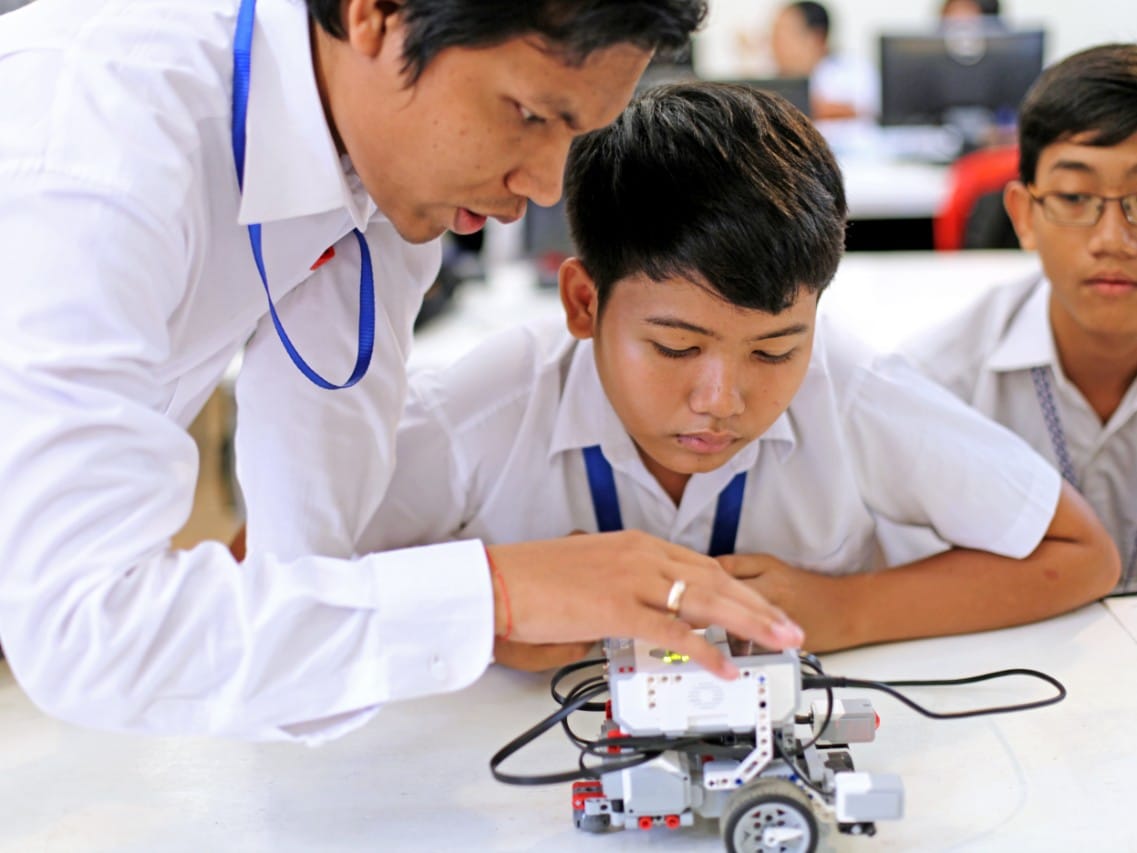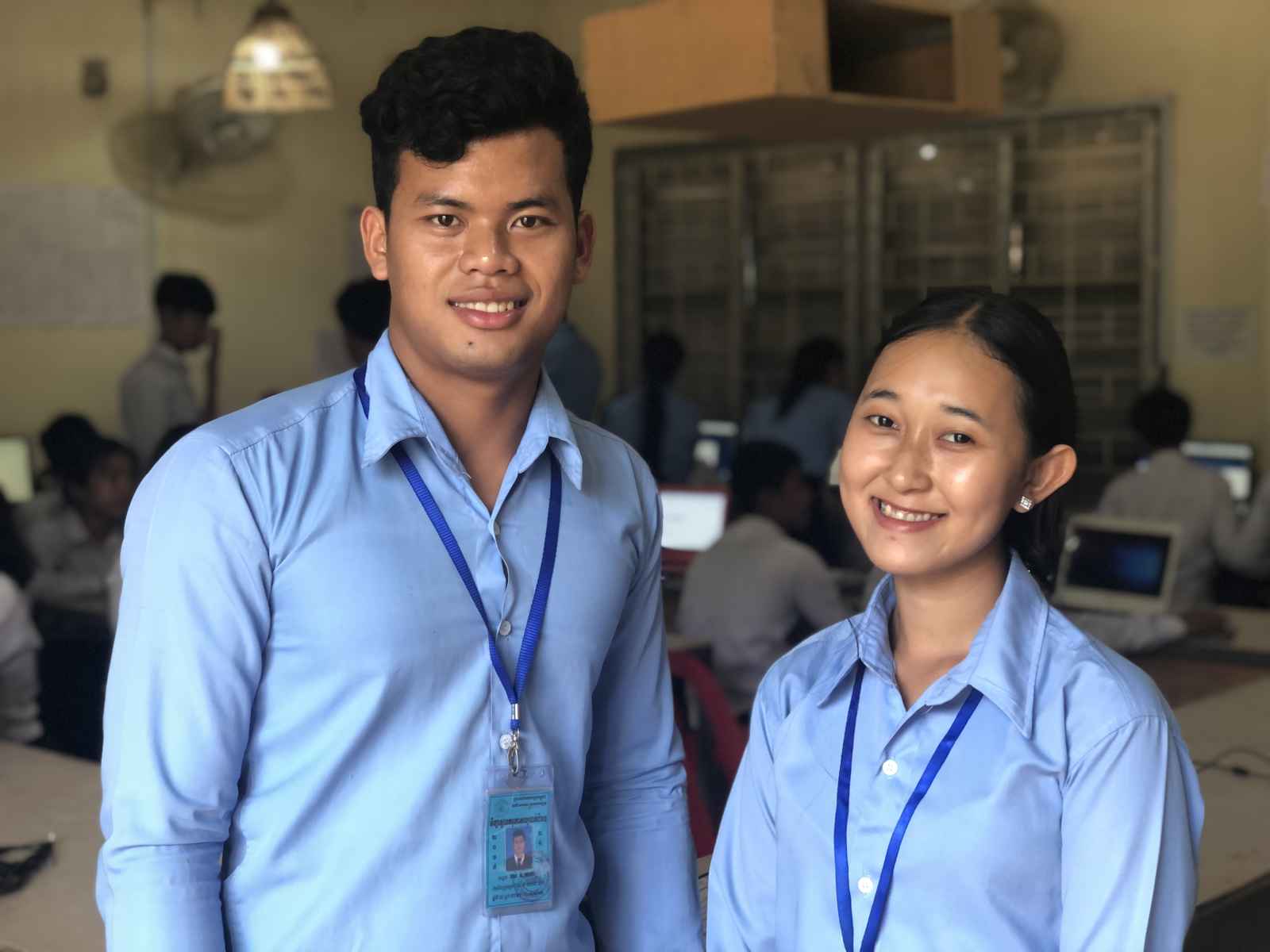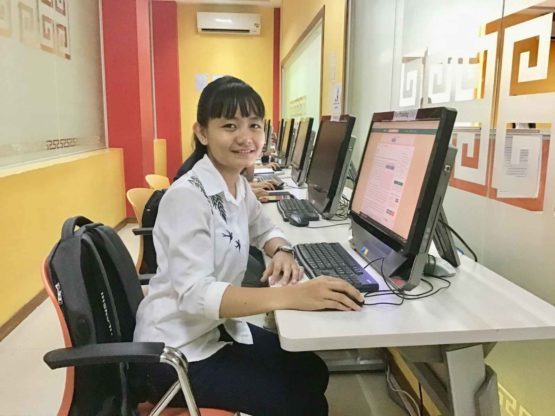A Case Study
ICT labs inevitably turning into graveyards full of malfunctioned computers collecting dust once the implementing NGO moves on. This was precisely the state we found Monivong Highschool’s computer lab when we received our first grant from The Atlassian Foundation in late 2015.
Over the following 2.5 years, the $550,000 we received from the Atlassian Foundation enabled us to establish ICT Education in all public high schools and the teacher training college in Battambang City, Cambodia. The ICT curriculum, delivered in the Khmer language on Grok Learning’s cloud-based platform, has given over 18,000 students the opportunity to learn essential computer literacy skills.
Today this ICT curriculum has been fully incorporated into the public curriculum. It is run entirely by the school’s administration and wholly funded by the Cambodian Ministry of Education.
This project has achieved something remarkable: true sustainability.
This report is a collection of stories, case studies and statistics that indicate the impact the program has had to date and will continue to have into the future.
In 2014, computer literacy was so low in Battambang City that the majority of students were graduating grade 12 without even basic computer literacy, making them unable to navigate through an increasingly digital world.
Attempts by NGOs to establish ICT education programs are notoriously unsustainable, with graveyards of unused, broken-down computer labs as the most common long-term outcome.
In 2015, Cambodian Children’s Trust (CCT) partnered with Grok Learning and the Atlassian Foundation to trial a different approach; we worked together with the public high schools in Battambang City to co-design an ICT education program.
In December 2014, Prof. James Curran and Prof. Tara Murphy, co-founders of Grok Learning, traveled to Cambodia to assist CCT directors, Tara Winkler and Jedtha Pon, with defining the scope for a small pilot to establish a computer coding program. After partnerships were established with the Ministry of Education and Monivong High School, Cambodian ICT teachers were recruited and a one-week Introduction to Programming pilot covering ‘Hour of Code’ and ‘Hello World’ was launched. The pilot was a success with the majority of students passing, despite the course work being advanced and entirely in English.
The enthusiasm from the students and the strength of the partnership with the school’s faculty encouraged us to progress towards stage 2, approaching the Atlassian Foundation to join the collaboration.
In 2015, we began co-designing a curriculum, aligned with the Cambodian Master Plan for ICT education that gave students a strong command of basic computer literacy, including:
We worked with Monivong School to set up energy-efficient computer labs in all the schools that were cost-effective to run. We ensured the school’s administration was online, moving them away from analog record-keeping so they could competently oversee the program.
We trained the teachers to deliver the course from the Grok Learning cloud-based platform and developed all required teaching resources. The auto-marking system meant that teachers didn’t need expertise in computing to teach the course. We trained the students and school administration to take care of the ongoing maintenance of the labs.
In 2016, we co-designed additional courses that gave students an introduction to advanced computing, including:
We then scaled the project into and the remaining four public schools and also partnered with the teacher training college so new teachers going into the public school workforce would already know how to deliver the curriculum.
By 2017, the schools and the teacher training college had all the knowledge required to deliver the course. Sustainability was achieved when the schools and the training college incorporated the ICT course into their budgets, resulting in no additional funding required from CCT via the Atlassian Foundation.
Three years after funding ceased, the program is still fully funded by the schools and the training college with over 20,000 students and over 500 teachers completing the course. Thousands of students continue to enroll each year. Some students have gone on to compete in international STEM competitions, become national STEM champions and have gone on to study computer science and engineering university degrees.
Public School Students Have Completed The ICT Course
‘Ninja’ Students Have Been Trained In Advanced ICT
Teachers Have Been Trained To Deliver The Ict Curriculum
In November 2019, CCT’s ICT students were invited to the 15th Annual STEM Festival in Phnom Penh. At the 2-day festival, they presented their ICT student projects and entered the robot-sumo competition, and they won!
It was their first time being invited to the festival, so to win the competition is such a fantastic achievment. Three of the ICT students who went to Phnom Penh are enrolled in CCT’s Youth Centre programs.
There were 5 groups in the robot-sumo competition, two of the groups were CCT’s ICT students from 2 public schools in Battambang. The other three groups came from international/private schools in Phnom Penh.
Students Competed In National And International Stem Competitions In 2019
National Competitions Were Won By Ict Students In 2019
New ‘Ninja’ Students Were Trained In Advanced Ict In 2019
In 2019, a team of four female students who study CCT’s ICT program made it to the semi-finals for the Technovation global competition- the world’s largest tech entrepreneurship program for young women.
The competition challenges girls all over the world to identify community problems, build a mobile application to address the problems, and design a business plan to market the app. And out of the 1,900 teams around the world they made the semi-finals!
Their team is called Agent Bring Help and they designed an app, Cheery, that helps people suffering with mental health issues.
Srey Sambath ,Chea Hong Heng, Chao Lang Sreng, So Sothanet, Roth Brophea, Chhai Leng and Linghor Hoeng started the ICT program in 2015. They have all gone on to study Computer Science or Software Engineering.
Hong Sovichet was a Ninja student in 2015. He is now studying Computer Science in Phnom Penh and interning at an IT company.
Kong Sophaldevid was a Ninja student in 2015. He is now studying Computer Science at Phnom Penh University.
Wune Mey was a Ninja student in 2017. She is now studying Software Engineering at Kirirom Institute of Technology.
Orn Siveng was a Ninja student in 2018. She is studying Software Engineering at Kirirom Institute of Technology.
Pan Soketanak was a Ninja student in 2018. He is now studying Computer Science.

In 2017, when Sophearom and Mavinai were in high school, they completed our ICT program. Now, they are in their final year of teacher training college, and they’ll soon be leading the next generation of public school ICT students.
Throughout their final years of high school, Sophearom and Mavinai got the opportunity to study our ICT course using the Grok Learning platform. Mavinai pursued a career as an ICT teacher because she could see the power technology has to improve lives, and she wanted other young people to know about it. “I want my country to be a developed country. Many countries around the world know and use digital systems, and I want that for Cambodia too,” she says.
Now putting their skills to practical use as they undergo work placement at Monivong High School, Sophearom and Mavinai are excited to be using the CCT-developed ICT curriculum and the Grok Learning system to teach their students, three years after learning the program themselves.
“The program is very helpful. It is an efficient program and the lessons are easy for my class to understand,” says Mavinai.
“I am really excited about using CCT’s ICT program!”


Sovannrath Ros, now 18, graduated from a public high school in Battambang in 2018.
In Grade 11 and Grade 12, she studied Basics of ICT I and II, Adobe Photoshop, Web Design and Robotic Programming through CCT’s ICT program. The Basics of ICT and Adobe Photoshop were included in her daily schedule as they are core subjects in her high school, whereas Web Design and Robotic Programming were 2-week courses which CCT offered as extra classes during school holidays.
Sovannrath, who is now studying Civil Engineering at university, recently wrote a blog for CCT about why it’s important for high school students to access ICT programs and why girls should pursue careers in ICT.